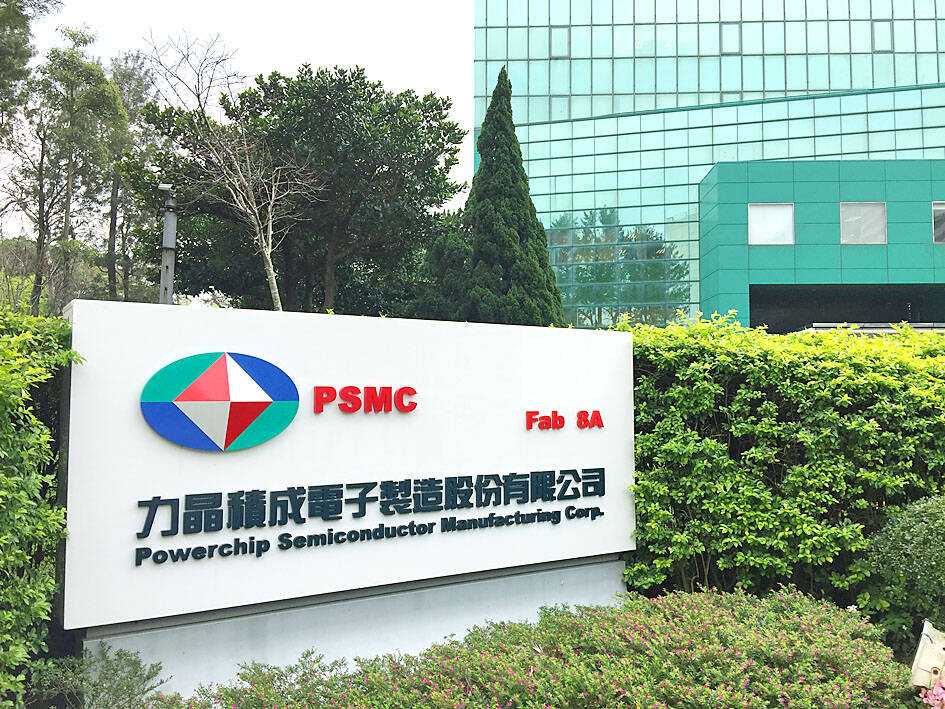Powerchip Semiconductor Manufacturing Corp (力積電) yesterday reduced capital spending for this year by about 43 percent to US$850 million, due to sluggish demand for display driver ICs and DRAM chips.
The company primarily makes display driver ICs and power management ICs.
Powerchip had planned to invest US$1.5 billion in new facilities and manufacturing equipment to expand 12-inch wafer capacity in Miaoli County’s Tongluo Science Park (銅鑼科學園區).

Photo: Grace Hung, Taipei Times
However, sluggish demand for CMOS image sensors and driver ICs used in handset and TV displays have caused a significant increase in customers’ inventories, it said.
Inventories at DRAM customers have also been piling up, due to sluggish demand, it added.
The DRAM, display driver IC and image sensor businesses contributed about 62 percent to the company’s revenue last quarter.
“Customer demand has reversed after our revenue peaked in the second quarter,” Powerchip president Brian Shieh (謝再居) told an online conference. “We expect customers to request production cuts to adjust their inventories in the third and fourth quarters.”
As some customers, mainly driver IC companies, have defaulted on long-term supply agreements, Powerchip has agreed to extend some contracts by six months to one year to help customers avoid payment penalties, Shieh said.
Aside from sagging demand, serious delays in construction at the science park, limited accessibility to key manufacturing equipment and labor shortages have factored in the decision to reduce capital spending, he said.
Powerchip expects the new fab to start test runs in the third or fourth quarter of next year, rather than at the beginning of next year, Shieh said.
The chipmaker expects revenue decline this quarter to slow down from last quarter’s 12 percent drop, he said.
Net profit last quarter dropped 13.5 percent to NT$6.07 billion (US$190.3 million), compared with NT$7.02 billion in the second quarter.
On an annual basis, net profit surged 37.64 percent from NT$4.41 billion.
In the first three quarters of this year, net profit soared about 99 percent to NT$19.72 billion from NT$9.89 billion a year earlier, with earnings per share expanding from NT$3.07 to NT$5.4.
The US’ new curbs on chip exports to China would benefit the company, as it would lead to more orders from customers, Powerchip said.

HANDOVER POLICY: Approving the probe means that the new US administration of Donald Trump is likely to have the option to impose trade restrictions on China US President Joe Biden’s administration is set to initiate a trade investigation into Chinese semiconductors in the coming days as part of a push to reduce reliance on a technology that US officials believe poses national security risks. The probe could result in tariffs or other measures to restrict imports on older-model semiconductors and the products containing them, including medical devices, vehicles, smartphones and weaponry, people familiar with the matter said. The investigation examining so-called foundational chips could take months to conclude, meaning that any reaction to the findings would be left to the discretion of US president-elect Donald Trump’s incoming team. Biden

INVESTMENT: Jun Seki, chief strategy officer for Hon Hai’s EV arm, and his team are currently in talks in France with Renault, Nissan’s 36 percent shareholder Hon Hai Precision Industry Co (鴻海精密), the iPhone maker known as Foxconn Technology Group (富士康科技集團) internationally, is in talks with Nissan Motor Co’s biggest shareholder Renault SA about its willingness to sell its shares in the Japanese automaker, the Central News Agency (CNA) said, citing people it did not identify. Nissan and fellow Japanese automaker, Honda Motor Co, are exploring a merger that would create a rival to Toyota Motor Corp in Japan and better position the combined company to face competitive challenges around the world, people familiar with the matter said on Wednesday. However, one potential spanner in the works is

Call it an antidote to fast fashion: Japanese jeans hand-dyed with natural indigo and weaved on a clackety vintage loom, then sold at a premium to global denim connoisseurs. Unlike their mass-produced cousins, the tough garments crafted at the small Momotaro Jeans factory in southwest Japan are designed to be worn for decades, and come with a lifetime repair warranty. On site, Yoshiharu Okamoto gently dips cotton strings into a tub of deep blue liquid, which stains his hands and nails as he repeats the process. The cotton is imported from Zimbabwe, but the natural indigo they use is harvested in Japan —

HON HAI LURKS: The ‘Nikkei’ reported that Foxconn’s interest in Nissan accelerated the Honda-merger effort out of fears it might be taken over by the Taiwanese firm Nissan Motor Co has become the latest buyout target in Japan as it explores a merger with Honda Motor Co and faces an overture from Hon Hai Precision Industry Co (鴻海精密), known as Foxconn Technology Group (富士康科技集團) internationally. Shares in Nissan yesterday jumped 24 percent, the most on record, to hit the daily limit, after the two Japanese automakers acknowledged that talks are ongoing to better position themselves for competitive challenges during a time of upheaval in the global auto industry. Foxconn — a Taipei-based manufacturer of iPhones, which has been investing heavily in factories to build electric vehicles — has also